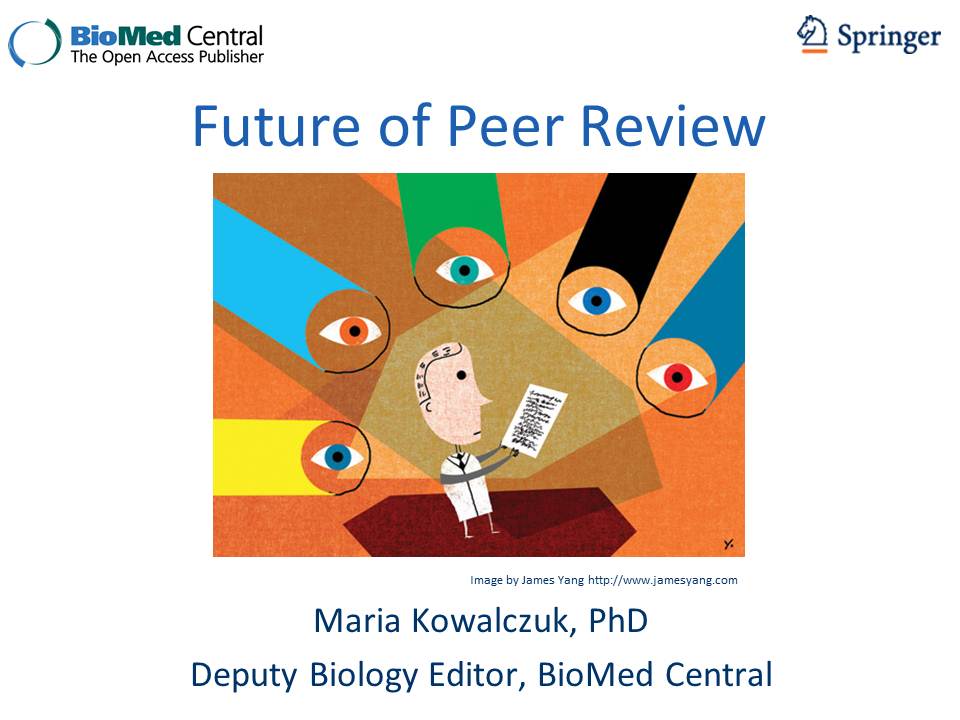A recent Research Hive Seminar organized by the Library of the University of Sussex featured presentations from Maria Kowalczuk, BioMed Central’s Deputy Biology Editor and Martin Eve, a lecturer in English Literature at the University of Lincoln. The discussion focused on alternatives to traditional peer review and the future of peer review across different disciplines.
Maria highlighted the peer review innovations adopted by BioMed Central and other publishers of biology and medical journals within the last few years in response to the criticism of traditional peer review.

Martin, a co-founder of the Open Library of Humanities – a new project aiming at bringing the open access publishing model to the humanities – focused on whether the model of publishing all papers that are judged to be technically sound, employed, for example, by the journal PLoS ONE, can be applied in the arts and humanities.
It is clear that journals publishing in the biology and medical sciences have progressed much further than those in the arts and humanities in implementing the open access publishing model and experimenting with different peer review models. A major innovation is open peer review, where the identity of the referees is known to the authors and vice versa, and the referee reports and the authors’ responses are publicly available on published articles. This brings an increase in transparency and accountability to both referees and editors, particularly crucial in medical journals where research can be quickly translated into clinical practice. This is in sharp contrast to the double-blind peer review that is widely used in the arts and humanities. BioMed Central was praised for being one of few publishers to implement open peer review on some of its journals.
Other developments in enhancing the peer review experience for authors focus on reducing the number of times a manuscript is peer reviewed. This lessens the burden on reviewers and shortens the time to publication. At BioMed Central this is implemented via re-review opt-out or via ‘journal cascades’ that enable transfer of a manuscript to a less selective journal together with the referee reports. At present many publishers offer transfers within their portfolios of journals, but we are also seeing cross-publisher initiatives such as the Neuroscience Peer Review Consortium.
An innovation that has not been widely tested yet is a system of peer review that is not linked to a particular journal, for example, as offered by Peerage of Science, supported by several BioMed Central journals, and Rubriq. This generated much discussion about the role of journals and scientific communities behind them.
In contrast to the biology and medical sciences, open access publishing in the arts and humanities is not as widespread. The Open Library of Humanities seemingly taking its cue from PLoS ONE is grappling with what ‘technically sound’ may mean in the arts and humanities. A point raised in the discussion was whether it is fair to expect PhD students to write very high quality theses, only to move the goalposts afterwards towards publications that are simply ‘technically sound’? Unlike the biology and medical sciences where journal Impact Factors play a (much-maligned) role in measuring the ‘interest’ and ‘importance’ of research findings, citations in the humanities are not a measure of quality as often bad studies are discussed and criticised, and impact factors simply don’t matter to the same extent.
It was acknowledged that Article Processing Charges (APCs) may be a barrier to open access publishing in the arts and humanities as funding is different to the biology and medical sciences. Since many researchers are not funded, authors could find it difficult to pay the APCs.
In summary, the discussion at the seminar was particularly relevant in light of the new open access policy of the Research Councils UK. At BioMed Central we are confident that we can offer a range of peer review models across our journals, it’s certainly not a case of one size fits all. We will be further discussing how to avoid the ‘tyranny’ of current peer review practices at this year’s BioMed Central event on 21 April during the Experimental Biology meeting in Boston.
One Comment